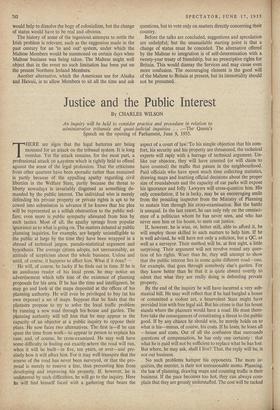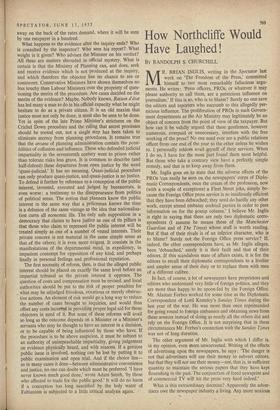Justice and the Public Interest
BY CHARLES WILSON An inquiry will be held to consider practice and procedure in relation to administrative tribunals and quasi-judicial inquiries. . . .—The Queen's Speech on the opening of Parliament, June 9, 1955.
THERE are signs that the legal batteries are being mounted for an attack on the tribunal system. It is long overdue. Yet the attack remains, for the most part. a professional attack on a/system which is rightly held to offend against the sense of the legal profession. That the criticisms from other quarters have been sporadic rather than sustained is partly because of the appalling apathy regarding civil liberties in the Welfare State, partly because the threat to liberty nowadays is invariably disguised as something de- manded by the public interest. The individual who is merely defending his private property or private rights is apt to be cowed into submission in advance if he knows that his plea will be represented as a selfish obstruction to the public wel- fare; even more is public sympathy alienated from him by such tactics. Most of all, the apathy springs from popular ignorance as to what is going on. The matters debated at public planning inquiries, for example, are largely unintelligible to the public at large by the time they have been wrapped in a shroud of technical jargon, pseudo-statistical argument and hypothesis. The average citizen adopts, not unreasonably, an attitude of scepticism about the whole business. Unless and until, of course, it happens to affect him. What if it does?
He will, of course, be lucky if he finds out in time. If he is an assiduous reader of his local press, he may notice an advertisement which tells him of the existence of planning proposals for his area. If he has the time and intelligence, he may go and look at the maps deposited at the offices of his planning authority. He will even be privileged to buy (at his own expense) a set of maps. Suppose that he finds that the planners propose to try to solve the local traffic problem by running a new road through his house and garden. The planning authority will tell him that he may appear in the capacity of an objector at a public inquiry to oppose their plans. He now faces two alternatives. The first is—if he can spare the time from work—to appear in person to explain his case, and, of course, be cross-examined. He may well have some difficulty in finding out exactly where the road will run, when it will be built—in five, ten years. or ever—and pre- cisely how it will affect him. For it may well transpire that the course of the road has never been surveyed, or that the pro- posal is merely to reserve a line, thus preventing him from developing and improving his property. If, however, he is undeterred by such difficulties, he will go to the inquiry. Here he will find himself faced with a gathering that bears the aspect of a court of law. To his simple objection that his com- fort, his security and his property are threatened, the technical experts will reply with a barrage of technical argument. Un- like our objector, they will have counted (or will claim to have counted) the traffic that passes in the neighbourhood. Paid officials who have spent much time collecting statistics, drawing maps and learning official decisions about the proper size of roundabouts and the capacity of car parks will expose his ignorance and folly. Lawyers will cross-question him. His only consolation, if he is lucky, may be an encouraging smile from the presiding inspector from the Ministry of Planning to sustain him through his cross-examination. But the battle is unequal. In the last resort, he oan only rely on the omnisci- ence of a politician whom he has never seen, and who has never seen him or his house, to mete out justice.
If, however, he is wise, or, better still, able to afford it, he will employ those skilled in such matters to help him. If he is well advised, he will have not only a solicitor, but a QC, as well as a surveyor. Their method_ will be, at first sight, a little surprising. Their argument will not revolve round any ques- tion of his rights. Wiser than he, they will attempt to show that the public interest lies in some quite different road--one, for example, that goes through somebody else's garden. For they know better than he that it is quite absurd overtly to admit that what they are really doing is defending private property.
By the end of the inquiry he will have incurred a very sub- stantial bill. He may well reflect that if he had burgled a house or committed a violent act, a benevolent State might have provided him with free legal aid. But his crime is that his house stands where the planners would have a road. He must there- fore take the consequences of constituting a threat to the public good. If by any chance he should win, he merely holds on to what is his—minus, of course, his costs. If he loses, he loses all —house and costs. Out of all the confusion that surrounds questions of compensation, he has only one certainty : that what he is paid will not be sufficient to replace what he has lost. But where, he may ask, shall I live? That, the reply will be, is not our business.
No such problems hamper his opponents. The more in- quiries, the merrier, is their not unreasonable motto. Planning. the law of planning, drawing maps and counting traffic is their business. if the pace becomes too hot, they can always corn- plain that they are grossly understaffed. The cost will be tucked away on the back of the rates demand, where it will be seen by one ratepayer in a hundred.
What happens to the evidence after the inquiry ends? Who is consulted by the inspector? Who sees his report? What weight is it given? Who advises the Minister on his verdict?
All these are matters shrouded in official mystery. What is certain is that the Ministry of Planning can, and does, seek and receive evidence which is not produced at the inquiry, and which therefore the objector has no chance to see or controvert. Conservative Ministers have shown themselves no less touchy than Labour Ministers over the propriety of ques- tioning the merits of the procedure. Are cases decided on the merits of the evidence? Maybe. Nobody knows. Raison d'etat has led many a man to do in his official capacity what he might hesitate to do as a private citizen. It is an old maxim that justice must not only be done; it must also be seen to be done. Yet in spite of the late Prime Minister's strictures on the Crichel Down procedure and the ruling that secret processes should be rooted out, not a single step has been taken to eliminate secrecy from planning procedures. It remains true that the arcana of planning administration contain the possi- bilities of collusion and influence. Those who defended judicial impartiality in the seventeenth century went to prison rather than tolerate risks less grave. It is common to describe (and half-defend) these departures from open justice by the word 'quasi-judicial.' It has no meaning. Quasi-judicial procedure can only produce quasi-justice, and quasi-justice is no justice. To defend it further by reference to a conception of the public interest, invented, executed and judged by bureaucrats, is even worse : a testimony to the disappearance from politics of political sense. The notion that planners know the public interest in the same way that a policeman knows the time is a delusion of the same vintage as the idea that nationalisa- tion cures all economic ills. The only safe supposition in a democracy that claims to have justice as one of its pillars is that those who claim to represent the public interest will be treated simply as one of a number of vested interests. Their private concern is not material in the same simple sense as that of the others; it is even more exigent. It consists in the manifestations of the departmental mind, in expediency, in impatient contempt for opposition of any kind, and perhaps finally in personal feelings and professional reputation.
The first necessity of reform, then, is that the alleged public interest should be placed on exactly the same level before an impartial tribunal as the private interest it opposes. The question of costs and compensation must be revised, and local authorities should be put to the risk of proper penalties for what may be adjudged frivolous, vexatious or merely obstruc- tive actions. An element of risk would go a long way to reduce the number of cases brought to inquiries, and would thus offset any costs incurred in providing proper legal aid for those objectors in need of it. But none of these reforms will avail so long as the outcome depends on a Minister or a Minister's servants who may be thought to have an interest in a decision, or to be capable of being influenced by those who have. If the procedure is to be above suspicion, it must be subject to an authority of unimpeachable impartiality, giving judgement on evidence physically heard, and with reasons. If a genuine public issue is involved, nothing can be lost by putting it to public examination and open trial. And if the choice lies— as in many cases it does—between administrative convenience and justice, no one can doubt which must be preferred. 'I have never known much good done,' wrote Adam Smith, 'by those who affected to trade for the public good.' It will do no harm if a conception too long sanctified by the holy water of Fabianism is subjected to a little critical analysis again.



































 Previous page
Previous page